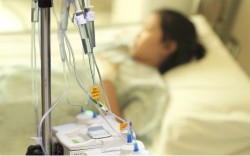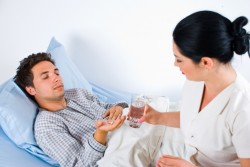How to Safely Withdraw From Ritalin
Like many other prescription drugs including painkillers and benzodiazepines, Ritalin can become addictive if you abuse the medication. Abusing Ritalin can lead to physical dependence on the drug, which makes quitting more difficult when you’re finally ready to overcome addiction. Fortunately, there are ways to withdraw from Ritalin safely without putting your health and personal comfort at risk.
If you’re suffering from Ritalin addiction, understand that help is available and nearby. Call our 24/7 confidential helpline at 800-816-1059(Who Answers?) to speak with a drug abuse counselor about your options for local drug rehab centers that treat Ritalin and amphetamine addiction.
Understanding Ritalin Withdrawal
When you use Ritalin at high doses for an extended period of time, your body can become physically dependent on the drug. This means that when you stop using Ritalin abruptly, your body will experience one or more withdrawal symptoms as it copes without its normal dosage of the drug. Ritalin withdrawal symptoms can range from mild to severe, based on the severity of the addiction and your medical history.
Common Ritalin withdrawal symptoms include:

Fatigue and depression are common Ritalin withdrawal symptoms.
- Extreme sleepiness
- Fatigue
- Insomnia
- Irregular sleep patterns
- Paranoia
- Dysphoria
- Irritability
- Aggression
- Depression
Tapering Ritalin
Tapering is when your doctor gradually reduces your dosage of Ritalin until you’re no longer using or physically dependent on the drug. This method prevents you from experiencing withdrawal symptoms, since your body has time to adjust to smaller doses of this amphetamine. Don’t try tapering Ritalin without medical supervision, since doing so may increase your risk for discomfort and certain health complications.
Detoxing from Ritalin
Ritalin detox is often conducted at drug rehab centers that specialize in addiction to amphetamines. Detox is performed in a safe, controlled medical environment so you have access to medical staff when you need help and support associated with withdrawal. A supervised medical detox is recommended if you quit Ritalin cold turkey, and face the risk of severe and uncomfortable withdrawal symptoms.
Most drug rehab centers prescribe medications that help reduce or eliminate certain withdrawal symptoms. For instance, you may be prescribed antidepressants to treat symptoms of depression when you quit using Ritalin. You might also be prescribed medications that address cravings for Ritalin and other substances.
Overcoming Ritalin Addiction
Drug rehab centers also offer counseling and other therapies in addition to drug detox services. These therapies help you overcome psychological causes of addiction that drove you to abusing Ritalin in the first place. Those who began abusing Ritalin due to post-traumatic stress disorder can receive counseling to overcome PTSD, while those who abuse Ritalin due to problems at home can participate in family counseling sessions aimed at improving domestic relationships.
Nobody should ever have to overcome addiction on their own without help and support. If you’re addicted to Ritalin or other amphetamines, call our 24/7 confidential helpline at 800-816-1059(Who Answers?) to speak with a drug abuse counselor about available treatment options. We’ll help you find drug rehab centers devoted to helping you achieve lifelong sobriety.
Amphetamine withdrawal can be extremely dangerous, and those who begin going through this syndrome will almost always require immediate medical treatment. It is important to seek help when going through amphetamine or stimulant withdrawal of any kind rather than attempting to do it on your own. Call 800-816-1059(Who Answers?) now to find safe, reliable treatment options for stimulant addiction rehab.
Getting Detox Treatment
According to the National Institute on Drug Abuse, “If stimulants are abused chronically, withdrawal symptoms––including fatigue, depression, and disturbed sleep patterns––can result when a person stops taking them.”
Many users believe they can quit their substance abuse without any medical help (also called going cold turkey), but this can be extremely dangerous with severe psychological symptoms like those listed above.
Therefore, it is important to seek detox treatment right away for your withdrawal symptoms. There, you will be given medications to minimize your cravings and other symptoms as well as attend therapy sessions that will help you transition into addiction treatment.
Withdrawal from amphetamines can be very dangerous because, unlike other substances like heroin or alcohol, there are no physical symptoms to let someone else know how bad they are becoming. Seeking detox treatment is a necessary step, and we can help you find safe, reliable detox programs where you can then transition smoothly into addiction rehab.
Hospital-based Care

Hospitalization may be necessary in certain cases.
Under certain circumstances, you may require hospitalization for your amphetamine withdrawal symptoms. As stated by the US Department of Veteran Affairs, “During high-dose stimulant use, often seen during binge episodes, individuals can experience stimulant-induced psychosis characterized by delusions, paranoid thinking and stereotyped compulsive behavior.” If you begin to experience these symptoms, call 911 immediately and get the treatment you need.
The paranoia, hostility, hallucinations, and delusions experienced during this stimulant-induced psychosis will all be extremely dangerous and can cause a person to hurt themselves or others. It is common for someone in the early stages of withdrawal to experience these issues, and immediate medical care is required.
In the hospital, you will be treated with benzodiazepines or another sedative and placed in a room where you will experience very little stimulation. Once your symptoms begin to subside, you will often be moved to a rehab center and treated for stimulant addiction.
How Long Does Amphetamine Withdrawal Treatment Last?
The initial treatment for amphetamine withdrawal, concerning the use of medications to minimize depression, stimulant-induced psychosis, and cravings and possible therapeutic interventions, will usually last about a week or two. However, the withdrawal symptoms associated with stimulants often last much longer than this brief period, and amphetamine withdrawal treatment will usually continue into the long-term rehab phase. In the beginning, though, controlling the severe symptoms associated with the crash period is the main concern of amphetamine withdrawal treatment.
Seek Amphetamine Abuse Treatment Now
You must never attempt to withdraw from amphetamine dependence on your own because the consequences can be very severe. Call 800-816-1059(Who Answers?) now to find rehab programs that will begin with detox and allow you to also receive the individualized addiction treatment program you require.
Do you have an amphetamine dependence or addiction? If so, you are running a lot of health risks, but you may be choosing to ignore them. Denial is a big part of addiction and it makes sense. When the addiction takes over, you can no longer think rationally about the situation you find yourself in because the situation isn’t rational; it’s out of control.
So, you find yourself justifying things. You ignore the amount you are really using. You overlook the negative consequences you are facing. And you pretend that you aren’t risking your health or your life because you avoid those discussions and thoughts. However, overdose is a very real risk and it can prove deadly.
Accepting the Risk
Of course, taking too much of a drug isn’t the exact reason that you die from an overdose. It is, instead, the effect that the drugs have on your body and the systems that they disrupt. A number of different avenues can all lead to death. For instance, you may die of stroke or you might die from the complications of a coma. Although overdose will begin the process, many diverse outcomes could lead to your demise.
That is scary to think about and you do need to think about it. You need to break through your denial and take an honest look at what you are doing to yourself and the dangers it exposes you to. When you can do that, you will see that the time has come for you to seek treatment. Only be ending your amphetamine dependence can you protect yourself from possible overdose and death.
But, where can you seek help? Amphetamines.com is the expert you can trust. By calling 800-816-1059(Who Answers?), you can have your questions answered, get tips about financing, and have actual rehab programs recommended. Call today!
Amphetamine Overdose Symptoms

Agitation and panic are common symptoms of amphetamine overdose.
It is important to remember that all amphetamine overdoses will manifest differently. Because amphetamines are a class of drug that includes many varied types of the drug, the way that they interact with the body is slightly different. Further, each user’s health and addiction history will also play a role. Therefore, see these descriptions as an outline and don’t ignore possible overdose just because it doesn’t look exactly like what is written here.
Initially, overdose will be signaled by the following symptoms:
- Agitation
- Tremors
- Overactive reflexes
- Quick breathing
- Confusion
- Violent behavior
- Hallucinations
- Panic
- High fever
- Rhabdomyolysis: death of muscle fibers and release of their contents into the bloodstream, which can lead to kidney failure
After the stimulation follows fatigue and depression.
The effects of overdose on the heart may include:
- Heartbeat irregularities, which can lead to organ failure
- High blood pressure
- Low blood pressure
- Cardiovascular collapse
The effects of overdose on the gastrointestinal symptoms may include:
- Nausea
- Vomiting
- Diarrhea
- Abdominal cramping
Fatal overdoses are typically preceded by convulsions and coma.
Overdose Treatment
If you or someone you know seem to be experiencing an amphetamine overdose, you need to seek medical help immediately. You cannot treat this at home. Contact an ambulance or go straight to the emergency room.
There are no medications specifically designed to fight amphetamine overdose, therefore, treatments will be focused on managing individual symptoms. For example, a common symptom like high fever may be treated with an ice bath to help decrease body temperature.
If the overdose causes seizures, you will be at increased risk of intracranial hemorrhage, which may mean that you will undergo a CT scan. IN addition, you will be given anticonvulsant medication, like benzodiazepines.
Should your amphetamine overdose involve rhabdomyolysis and put you at risk of renal failure, you will be treated with IV crystalloid to protect your kidneys. You will also have your liquid intake and output monitored. Should your kidneys begin to shut-down, you may undergo dialysis.
According to the Drug Abuse Network Warning Report: “Between 2005 and 2010, the number of emergency department (ED) visits involving attention deficit/hyperactivity disorder (ADHD) stimulant medications increased from 13,379 to 31,244 visits.” Overdose is on the rise. But, you don’t have to put yourself at risk. You can stop using. Let Amphetamines.com help. Call 800-816-1059(Who Answers?).
Amphetamine addiction treatment is a long process, especially because symptoms like depression and cravings can last much longer than those associated with other drugs of abuse. But it is important to be aware of the treatment process utilized when a person first comes into amphetamine addiction rehab or is hospitalized for the abuse of these drugs. If you need immediate treatment for amphetamine abuse, call 800-816-1059(Who Answers?).
Amphetamine Overdose and Psychosis
Amphetamine overdose, like other types of stimulant overdose, can be deadly. When an individual is first brought into addiction treatment, medical professionals usually check to make sure the patient isn’t showing signs of overdose, which according to the National Library of Medicine, include:
- Restlessness
- Confusion
- Aggression
- Panic
- Hallucinations
- Fast breathing
- Shaking
- Fever
- Dark red urine
- Fast or irregular heartbeat
- Dizziness
- Diarrhea
- Seizures
- Coma

The patient may be given sedatives if they are showing signs of aggression.
If the individual is experiencing these signs, they will be restrained if necessary and attended to with medication and other treatments as each symptom begins to show itself.
In addition to overdose, a person who has been abusing amphetamines for a long time can experience a type of psychosis that is caused by the drug, leading to many of the same issues, including paranoia, aggression, violent behavior, and hallucinations.
This is why restraints are often used in immediate treatment as well as the administration of benzodiazepines to minimize the individual’s symptoms and sedate them safely.
Those who are intoxicated and in danger of experiencing severe side effects as a result may also be given “activated charcoal and laxative, if the drug was taken by mouth” (NLM).
Testing and Exams
Often, the individual will also be tested for any other substances in their system as well as other issues that will be pertinent to their treatment. The common exams given during immediate amphetamine addiction treatment include:
- Blood tests
- Urine tests
- Chest x-rays
- CT scans
- EKGs
- Poison and toxicology screenings
Amphetamine Withdrawal Treatment
While still a common occurrence, not every individual who arrives in amphetamine addiction rehab is going through overdose or psychosis. Many realize they need help before this point or are sent to a treatment center by their families. However, this does lead to withdrawal once the individual stops taking amphetamines. Amphetamine withdrawal is treated medically in a number of ways:
- The administration of anticraving agents and antidepressants for withdrawal symptoms
- The administration of antipsychotics for any symptoms of psychosis
- Testing for any other substances
Over time, the medically assisted treatment for withdrawal will change, but the physician’s first priority is to stabilize the patient.
Transition into Addiction Rehab
Once the patient becomes more stable and depending on the facility that treated their acute symptoms, they will likely move on to a more long-term recovery program. This will often include the use of behavioral therapies as well as antidepressants and other medications where necessary. Patients must be stabilized and helped through the beginning stages of rehab before they can safely and more effectively begin the treatments that will help them end their amphetamine abuse.
Find Amphetamine Addiction Treatment Now
If you or someone you love is currently experiencing severe symptoms that may put you or someone else in danger, call 911 immediately. To find rehab programs in your area that can allow you to recover from amphetamine abuse and addiction, call 800-816-1059(Who Answers?) now.
According to the US Department of Veteran Affairs, “Pharmacological intervention may be necessary during stimulant-induced drug states” as well as throughout one’s withdrawal from amphetamines and addiction treatment. Because there is no medication officially approved to treat amphetamine addiction in the way there is for the treatment of opioid- or nicotine-based disorders, many people believe medication is not an option during this time. However, it can be a helpful and integral part of amphetamine addiction treatment.
During Immediate Stimulant-Induced Treatment
If a patient is brought into a treatment center or hospital while intoxicated by amphetamines, it is important for the individual to be protected from doing harm to themselves or others and cared for during this extremely volatile time. Medical professionals may use neuroleptics if the individual is experiencing severe psychosis or delirium. These medications can treat psychosis and help calm the individual. In some instances, benzodiazepines or other sedatives may be used, as all of these medications are preferable to the use of restraints.
Because many individuals brought in for treatment during high levels of stimulant intoxication experience psychosis, these medications are not withheld and are usually given to create a safer experience for the individual and those around them. Although the medication is not treating the addiction itself, it makes it much easier for the individual to receive the help they need through effective care and for everyone involved in their treatment to be safe.
During Withdrawal

Antidepressants are often given during amphetamine withdrawal.
Anti-craving agents are sometimes given to patients during the early stages of withdrawal. This is to minimize the intensity of the cravings, which during this time, can be extremely severe. Though these drugs are not normally used in late stage withdrawal, they can be very helpful to certain patients early on in recovery.
Antidepressants may also be given during withdrawal in order to minimize the severity of a person’s depressive symptoms associated with their amphetamine abuse. Amphetamines can cause some of the most intensive depression of any drug of abuse, and antidepressants should never be withheld from withdrawing amphetamine addicts because of this reason.
During Addiction Treatment
A person may be able to continue with their antidepressant medication if it is still helpful to them. This can also help the individual focus more readily on their behavioral therapy, which is usually the most important and intensive part of amphetamine addiction rehab. However, there is no medication that is specifically approved to treat amphetamine abuse––or any stimulant abuse for that matter. While there is there is no official medication used to treat the addiction itself, though, many medications can make the entire process smoother, safer, and more effective.
Can Medication Be Helpful During Amphetamine Addiction Rehab?
For some, certain medications can be very helpful throughout treatment. Just because they aren’t official pharmacological options for the treatment of the substance addiction do not mean they won’t make recovery itself easier or the individual more stable. With medication and, of course, behavioral therapy, you can begin to recover from amphetamine addiction and live the life you want again.
If you have questions about addiction treatment for amphetamines or want to find a rehab center in your area, call 800-816-1059(Who Answers?) today. We can help.
Amphetamines are both prescription drugs and dangerous addictive narcotics. These highly addictive stimulants are extremely volatile and have very serious consequences. If you have taken any of the drug information courses you know the majority of what amphetamines can do to your body. Unfortunately, they do not normally talk about something in these courses. This is dangerous amphetamine psychosis.
What is Amphetamine Psychosis?
According to the National Library of Medicine, amphetamine psychosis is a condition that comes from using amphetamines too frequently or in too high quantities. It essentially equals insanity. Most people who experience amphetamine psychosis have been taking amphetamines for a long time. What makes it so dangerous is:
- the fact that you cannot distinguish right from wrong
- you can inadvertently cause damage to yourself or others
- it can result in medical problems
- it can cause severe brain damage
- it can last anywhere from 10 days until the end of your life
While these are scary, they are not the only dangers of amphetamine psychosis. There are many more that scientists and doctors are currently studying in patients that currently have the disorder. Many doctors do not know how to adequately recognize and treat this disorder. They often mistake it for other disorders.
What are the Symptoms of Amphetamine Psychosis?

Paranoia and anxiety are common symptoms of amphetamine psychosis.
Something else that makes amphetamine psychosis so dangerous is its symptoms, which very closely resemble the symptoms of schizophrenic psychosis. These symptoms include:
- extreme agitation
- very high energy levels and restlessness
- hallucinations of sounds, sights, and feelings
- delusions of persecution, or unrealistic significance
- inappropriate emotional responses
- the inability to think clearly or rationally
- paranoia and anxiety
- entering a catatonic state, in extreme cases
These symptoms alone are frightening, but when combined with its other dangers the prospect of amphetamine psychosis becomes truly terrifying.
What are the Treatments for Amphetamine Psychosis?
As terrifyingly dangerous as amphetamine psychosis is, it is treatable. A combination of medications and other therapies are what is generally prescribed. Treatments of amphetamine psychosis are:
- newer anti-psychotic medications such as olanzapine
- medical care for secondary symptoms such as high blood pressure and increased heart rate
- benzodiazepines, which decrease the stimulant effect
- counseling
- psychotherapy
These treatments have a relatively high success rate, especially if the amphetamine psychosis is diagnosed as early as possible. Unfortunately, this disorder is often mistaken for others which are not controlled by medications and might result in accidental permanent hospitalization.
How to Find Treatment for Amphetamine Psychosis
While the treatments for amphetamine psychosis are typically successful, they are not always. One of the biggest factors in the success of these treatments is administering them early in the development of the psychosis. This makes finding treatment very important. For more information on amphetamine psychosis or to find a treatment center before amphetamine addiction results in psychosis, call us at 800-816-1059(Who Answers?). We can help you find the treatment you need before this dangerous condition becomes a serious problem.